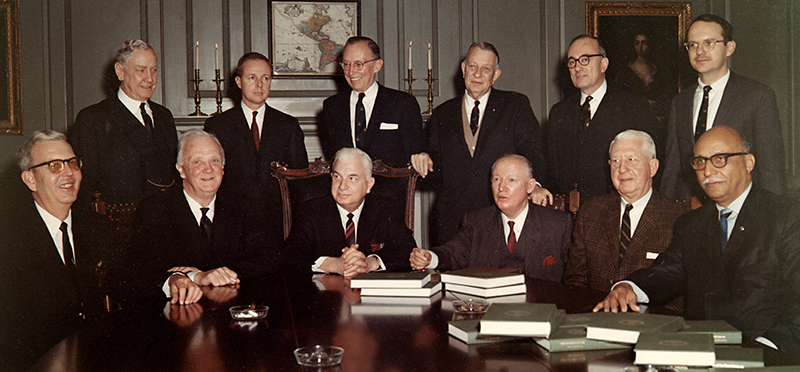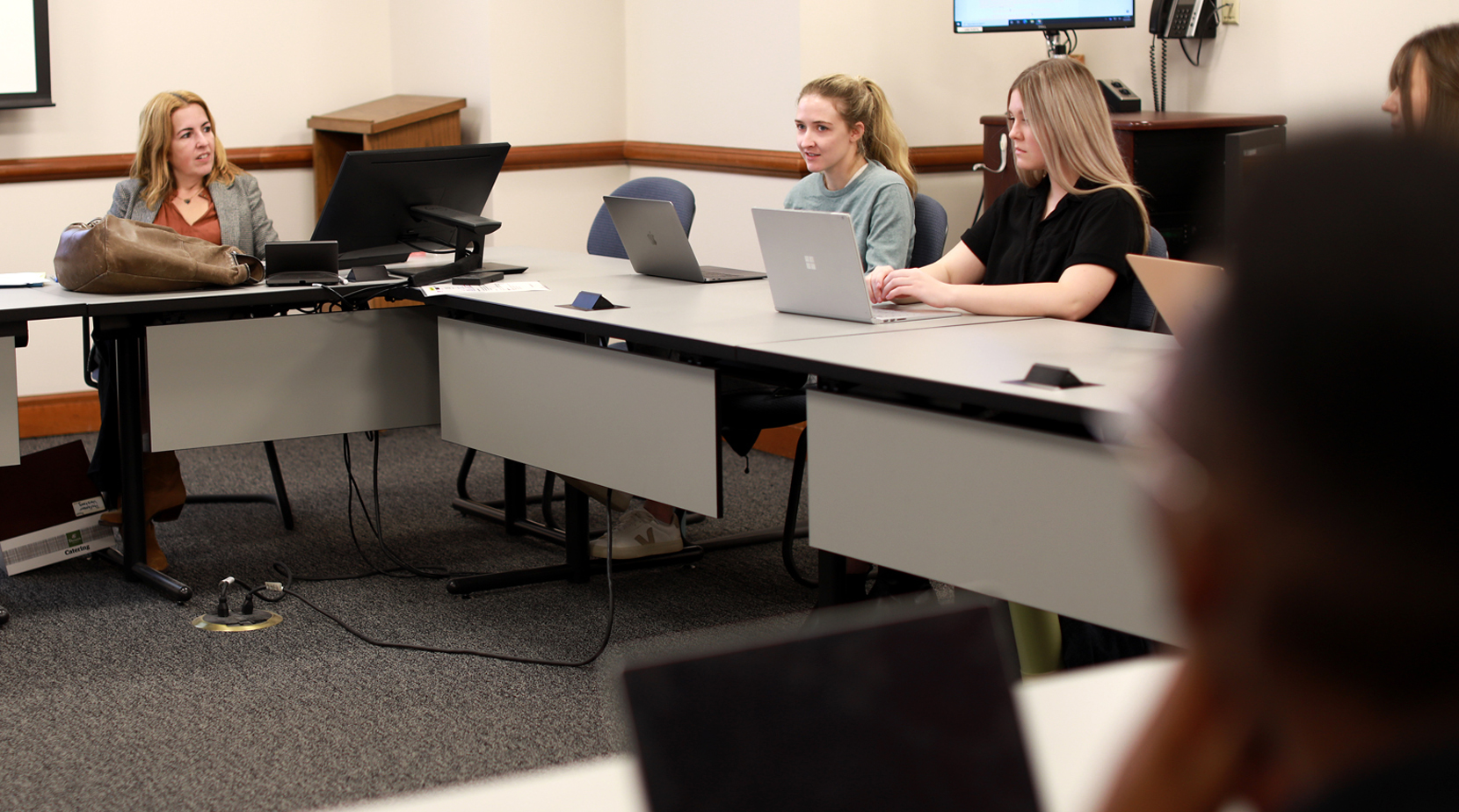Since the Virginia Constitution was last overhauled in 1971, more than a few things have changed on gender-related issues in the national legal and cultural landscape. The federal right to abortion was solidified and is now in flux state by state, the Supreme Court and Congress have affirmed the right to same-sex marriage, and women regularly serve in leadership positions in state and federal government.
To students in Professor Mila Versteeg’s Comparative Gender Equality class at the University of Virginia School of Law, who have studied how gender is treated in constitutions and laws around the globe, these signposts set up a classroom exercise in writing amendments to Virginia’s constitution — this time drafted from a feminist perspective.
“There’s a lot of impetus at the moment for amending state constitutions in light of Dobbs,” Versteeg said, referring to the Supreme Court decision in June that overturned Roe v. Wade.
During the midterm elections in November, voters in California, Michigan and Vermont passed state constitutional amendments protecting abortion rights, while Kentucky voters rejected one that would limit such rights. Meanwhile, Nevada added a sweeping equal rights amendment, prohibiting rights infringements on the basis of race, sex, sexual orientation and “gender identity,” among other things.
The last revision effort in Virginia was led by Professor A. E. Dick Howard ’61 in 1968, who served as executive director of the Commission on Constitutional Revision. That document repudiated a 1902 state constitution that had enshrined racist Jim Crow laws and abolished Reconstruction-era statutes.
 Commission on Constitutional Revision members (seated) Alexander M. Harman Jr., Colgate W. Darden, Gov. Albertis S. Harrison, Davis Y. Paschall, Ted Dalton, Oliver W. Hill; and (standing) J. Sloan Kuykendall, Albert V. Bryan Jr., Lewis F. Powell Jr. (who later became a U.S. Supreme Court justice), Professor and former Dean Hardy Cross Dillard, George M. Cochran and Professor A. E. Dick Howard. UVA Law Special Collections
Commission on Constitutional Revision members (seated) Alexander M. Harman Jr., Colgate W. Darden, Gov. Albertis S. Harrison, Davis Y. Paschall, Ted Dalton, Oliver W. Hill; and (standing) J. Sloan Kuykendall, Albert V. Bryan Jr., Lewis F. Powell Jr. (who later became a U.S. Supreme Court justice), Professor and former Dean Hardy Cross Dillard, George M. Cochran and Professor A. E. Dick Howard. UVA Law Special Collections
The feminist movement was just heating up nationwide when the commission began its deliberations. Women generally didn’t appear in the 1971 draft at all until a female delegate from Alexandria, Dorothy McDiarmid, proposed adding women to the antidiscrimination clause before sending the rewrite on to the voters for ratification. The change was made with little debate, Howard said, though the clause also carved out exceptions for education, preserving policies that allowed for an all-male population at the Virginia Military Institute.
Versteeg said that clause and other concerns made the constitution ripe for a refresh.
“The Virginia constitution does not address some of the most pressing issues for many women today, such as access to reproductive health care, abortion or universal pre-K education,” Versteeg said.
So, as the capstone project to Versteeg’s semester-long class, her students participated in mock drafting sessions, together redlining and rewriting outdated provisions of Virginia’s constitution, including some that have been explicitly negated by U.S. Supreme Court rulings.
As classes wound down for the fall semester, her students piled into a small classroom tucked away in the Law School’s library. Each student was responsible for reviewing constitutional law and the relevant statutory framework from an assigned country and to consider applying them to rewriting sections of the Virginia constitution to reflect their values and conceptions of gender equity.
Among other things, the students added a fundamental right to abortion and affordable health care that includes reproductive care for Virginians, changed the all-male pronouns that appeared throughout the document, and updated language that permitted schools to discriminate on the basis of gender.
Madeline Hodges ’24 drafted the section on abortion after studying the distinctions between Michigan’s constitutional amendment and California’s broader Proposition 1, both of which passed in November.
“We had a conversation previously about the Michigan one that passed and theirs was more of a balancing test [between individual rights and a compelling state interest], whereas I felt like just saying ‘no denying or interfering’ and leaving it to the discretion of medical professionals was better,” Hodges told the class.
On top of that, Hodges added a provision to ensure access to, and funding of, abortions for women who can’t afford one.
Another student, Makenna Cherry ’23, drafted the provisions to guarantee access to affordable health care, modeled on a new Oregon amendment and an existing Massachusetts provision. The students debated whether to keep Hodges’ explicit guarantee of abortion funding or to leave it as an implied part of Virginians’ fundamental right to affordable health care.
Versteeg encouraged them to make their preferences explicit. States have plenary powers to legislate about matters within their own borders, and the constitution may legislate on any number of topics, she said.
“Here the drafting philosophy is to add more words to make very clear what we mean,” Versteeg said. “If the U.S. Constitution were a little more clear on many things, we may have a lot fewer cases at the Supreme Court.”
And unconstitutional provisions generally are not removed from state constitutions.
“There are still a lot of horrible provisions on race in state constitutions across the country,” Versteeg said in an interview before the class. “There are many provisions in state constitutions that are unconstitutional — if they’re declared unconstitutional, courts will stop enforcing them. But they stay on the books.”
Versteeg noted that the students’ proposals did create some tensions with federal law. If adopted, they would be subject to federal constitutional challenge. Even if the amendments might be found unconstitutional, Versteeg said, they would nonetheless signal residents’ values.
“If portions of it turn out to be unconstitutional, then it is clear to the public that it is the interpretations by the Supreme Court that prevent Virginians from having their preferred policies,” Versteeg said.
 Versteeg (left), who is a director of the school’s Center for International & Comparative Law and the Human Rights Program, is the Henry L. and Grace Doherty Charitable Foundation Professor of Law. Photo by Julia Davis
Versteeg (left), who is a director of the school’s Center for International & Comparative Law and the Human Rights Program, is the Henry L. and Grace Doherty Charitable Foundation Professor of Law. Photo by Julia Davis
The status of same-sex marriage under federal and state law was another thorny social issue the students analyzed and tackled in their amendments. A state constitutional amendment banning same-sex marriage and domestic partnerships was approved by almost 60% of Virginia voters in 2006 before being effectively overturned by a 4th U.S. Circuit Court of Appeals ruling in 2014. The General Assembly in 2020 repealed Virginia statutes that ban same-sex marriage, but the earlier amendment is still on the books.
C. Sean Onwualu ’24 took on the task of deleting the 2007 amendment language and creating a provision for domestic partnerships similar to Canada’s common law marriages.
“I just removed the [marriage] language ‘between a man and a woman’ and just [wrote] ‘a union between any two persons’ — I feel like that encompasses most if not all identities,” Onwualu said. “I separated domestic partnerships because I feel like they’re legally different in a sense. I just said that a union between two people who are domiciled together can count as a domestic partnership and is protected under the same laws in this section.”
After the provisions were drafted, debated and revised, students voted on the final product.
“The goal of the exercise was to bring together all the themes from the semester and to explore what role constitutions can play in promoting gender equality,” Versteeg said.
Though revising Virginia’s constitution 50 years ago was a multistep process that took time, it was achievable, Howard said. Today, such a “wholesale revision” would face an entirely different set of challenges.
“Indeed, I shudder at the thought of trying to rewrite the constitution of Virginia in today’s polarized and poisoned atmosphere,” Howard said. “One can imagine a referendum campaign, marred by conspiracy theories and skewed by lavish spending.”
Amendments, however, offer an important safety valve, he said.
“State constitutions are easily amended,” he said. “Ready access to the amending process offers an avenue for addressing specific changes in keeping with changing times.”
He commended Versteeg and her students for their efforts at taking on the drafting process and writing amendments.
“Professor Versteeg has done her students a manifest service by putting them in the chairs of constitution-makers,” Howard said. “It’s one thing to parse judicial decisions, quite something else to try one’s hand at drafting a constitution. Moreover, the use of gender issues as the class’s focus reminds us that state constitutions evolve with changing times in a way that the text of the United States Constitution does not. As Thomas Jefferson reminded us, speaking of state constitutions, ‘The earth belongs always to the living generation.’”
Founded in 1819, the University of Virginia School of Law is the second-oldest continuously operating law school in the nation. Consistently ranked among the top law schools, Virginia is a world-renowned training ground for distinguished lawyers and public servants, instilling in them a commitment to leadership, integrity and community service.


